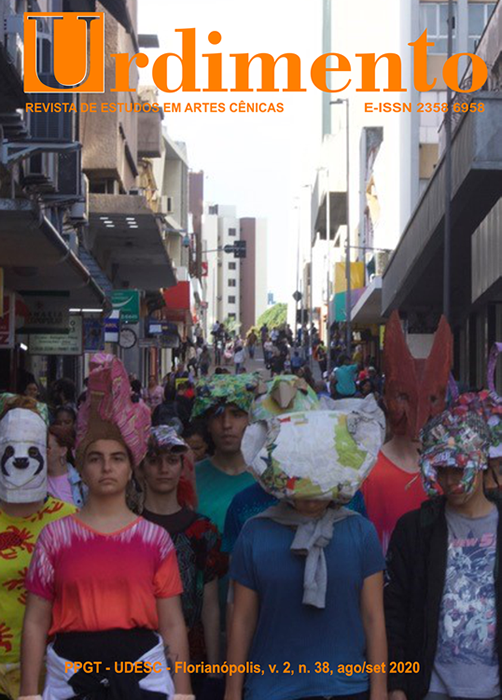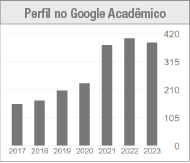Hélio Oiticica's auto-teatro: provocations of an environmental art
DOI:
https://doi.org/10.5965/14145731023820200007Keywords:
Environmental art, Body, Space, Performance, ConvivialityAbstract
This article proposes a current debate on scenic space. The Brazilian artist Hélio Oiticica treated the space and the notion of environmental art in his inventions, through the approximation of the performance, with attention to the body and the social life. The artist subverted the limits of artistic languages in order to experience the conflicts between art and reality. By coining the notion of self-theater, it is possible to conclude, along with other authors, that Oiticica built a path from screens to bodies, considering the establishment of the environment through the architectural dimension that was triggered by his interest in three-dimensionality. Then he will deal with the liberation of color from static supports until the understanding of space as a social phenomenon along with the radical opening for the invention of other participants in his propositions, going beyond participation.Downloads
References
DADORNO, Theodor. Indústria cultural e sociedade / Theodor W. Adorno; seleção de textos Jorge Mattos Brito de Almeida. Trad. por Juba Elisabeth Levy... [et a1.]. São Paulo: Paz e Terra, 2002.
BOURRIAUD, Nicolas. Estética Relacional. Buenos Aires: Ed. Adriana Hidalgo. 2007.
DOCTORS, Marcio. Espaço de Instalações Permanentes do Museu do Açude - Hélio Oiticica. Rio de Janeiro: Museu do Açude, 2000.
OITICICA FILHO, César; VIEIRA, Ingrid (Org.). Encontros Hélio Oiticica. Rio de Janeiro: Beco do Azougue Editorial, 2010.
OITICICA, Hélio. “Uma arte sem medo” In: OITICICA FILHO, César; VIEIRA, Ingrid (Org.). Encontros Hélio Oiticica. Rio de Janeiro: Beco do Azougue Editorial, 2010.
KNAB, Ken. A alegria da Revolução. Trad. Railton Sousa Guedes e Coletivo Periferia. 2003.
FREITAS, Artur. Contra-Arte: vanguardas, conceitualismo e arte de guerrilha - 1969 -1973. Tese de Doutorado. Pós- Graduação em História. Universidade Federal do Paraná. 2007.
MOSTAÇO, Edélcio. O Sol do novo mundo. Hélio Oiticica e o teatro ambiental. In: PARANHOS, K. (Org.). História, Teatro e Política. São Paulo: Ed. Boitempo, 2012.
OITICICA, Hélio. Arquivo 0194.73, 1973. Disponível em: http://54.232.114.233/extranet/enciclopedia/ho/detalhe/docs/dsp_imagem.cfm?name=Normal/0194.73%20p08%20-%20484.JPG. Acesso em: 12 jan. 2019.
OITICICIA, Hélio. Aspiro ao grande labirinto. Rio de Janeiro: Rocco, 1986.
OITICICA, Hélio. Caderno de anotações de Hélio Oiticica: arquivo 0182.61. São Paulo, Itaú Cultural, 1961.
OITICICA, Hélio. Entrevista a Jary Cardoso. "Um mito Vadio". Folhetim, 05 nov. 1978.
SCHECHNER, Richard. Environmental Theater. The Applause Acting Series. New York. 1994.
SPERLING, David. Corpo + Arte = Arquitetura: Proposições de Hélio Oiticica e Lygia Clark. In: BRAGA, Paula (org.) Fios Soltos: a arte de Hélio Oiticica. São Paulo: Perspectiva, 2008. p.117 a 135.
TAYLOR, Diana. Hacia una definición de Performance. 2001. Disponível em: http://performancelogia.blogspot.mx/2007/08/hacia-una-definicin-de-erformance.html. Aceso em: 04 jan. 2017.
Downloads
Published
How to Cite
Issue
Section
License
Copyright (c) 2020 Urdimento - Revista de Estudos em Artes Cênicas

This work is licensed under a Creative Commons Attribution 4.0 International License.
Copyright Statement
The articles published by the magazine are free to use. The copyright is all assigned to the magazine. The articles whose authors are identified represent the expression from the point of view of their authors and not the official position of the journal Urdimento. The author (s) undertakes whenever publishing material relating to the article published in Revista Urdimento mention the said publication as follows: This article was originally published by Urdimento magazine in its volume (put the volume), number (put the number) in the year of (put the year) and can be accessed at:
http://www.revistas.udesc.br/index.php/urdimento
This work is licensed under a Creative Commons Attribution 4.0 International License.




